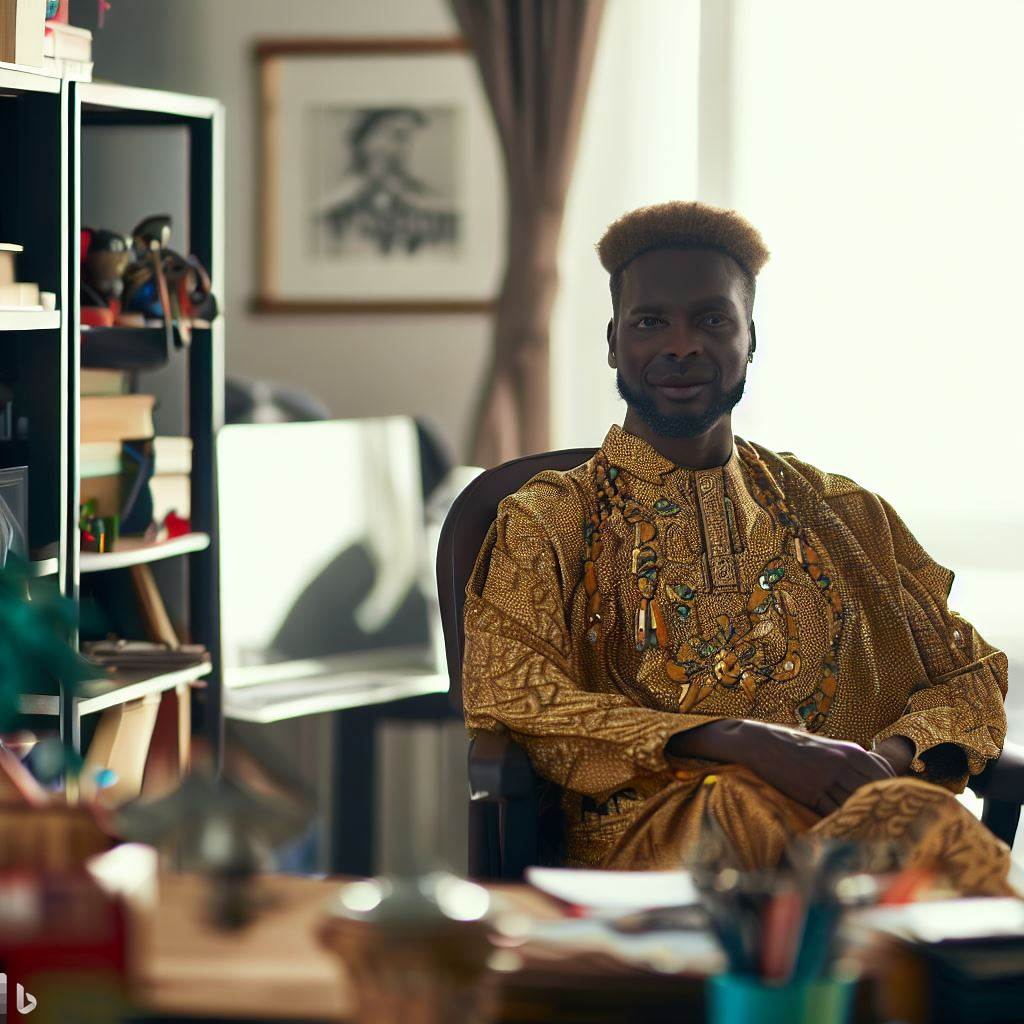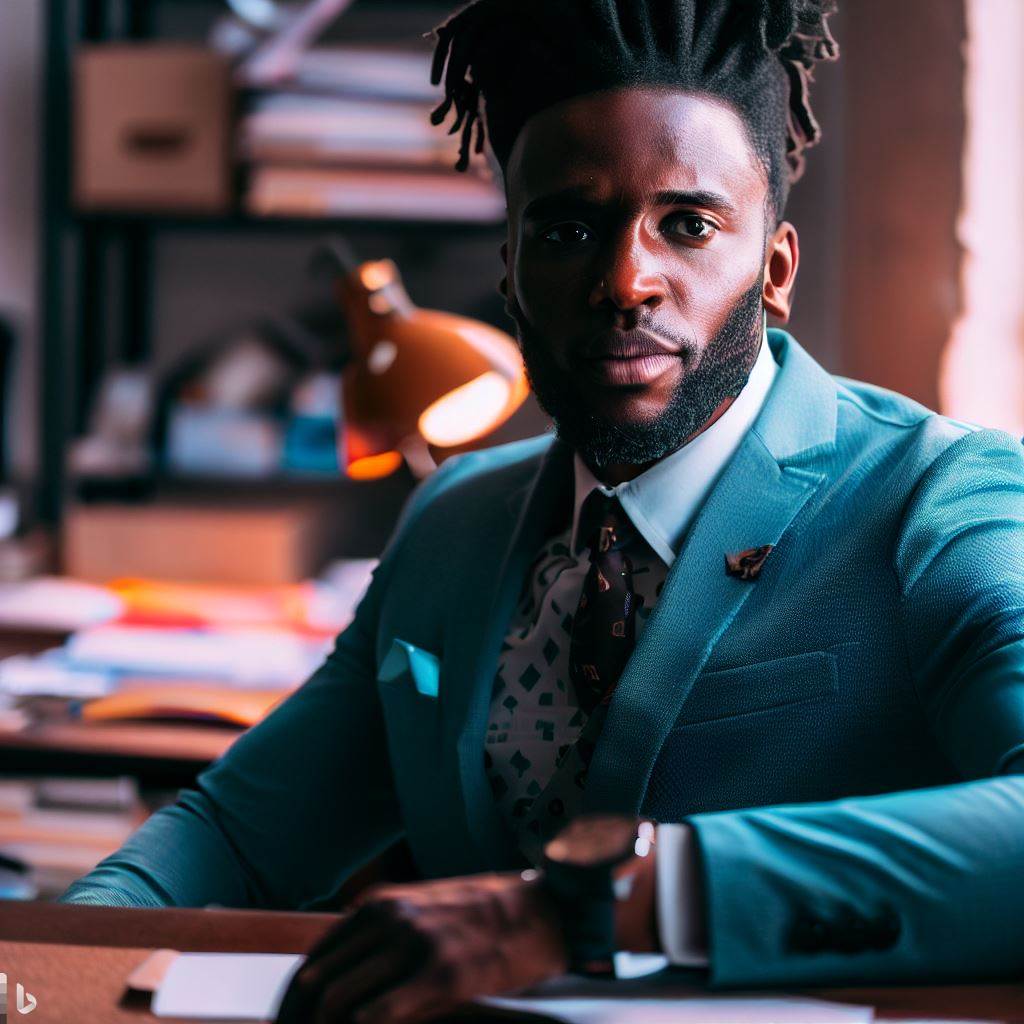Introduction
Let’s examine how Nigerian fashion designers exert influence worldwide.
Nigerian fashion designers have gained extensive influence globally within the fashion industry.
Known for their creativity and unique style, Nigerian fashion designers influence worldwide have put African fashion on the map.
In this blog post, we will explore the impact and reach of Nigerian fashion designers worldwide.
A. Brief explanation of Nigerian fashion designers
Nigerian fashion designers are talented individuals who create innovative and stylish clothing, accessories, and footwear.
They showcase their craftsmanship and cultural heritage through their designs, which often incorporate vibrant prints and patterns.
Nigerian designers have a deep understanding of fashion trends and have successfully merged traditional and contemporary elements.
B. Overview of the topic
The influence of Nigerian fashion designers extends far beyond the shores of Nigeria.
Their designs have captivated fashion enthusiasts worldwide, attracting both local and international attention.
Nigerian designers have gained recognition for their unique aesthetic and ability to showcase the beauty and diversity of African fashion.
Nigerian fashion designers have also played a significant role in promoting African fashion globally.
Through fashion shows, collaborations, and social media, they have created a platform for African designers to showcase their talent.
As a result, Nigerian fashion has become a prominent influence in the global fashion industry.
Basically, Nigerian fashion designers have made a significant impact on the global fashion scene.
Their creativity, craftsmanship, and ability to blend tradition with modernity have earned them praise and admiration worldwide.
Through their unique designs, Nigerian fashion designers continue to shape and influence the fashion industry globally.
Read: Exploring Fashion Designer Salaries in Nigeria 2024
Traditional Nigerian Fashion
A. History of Nigerian traditional fashion
- Nigerian traditional fashion dates back centuries, reflecting the rich cultural heritage of the various ethnic groups.
- Traditional clothing in Nigeria is diverse, with each ethnic group having distinct styles, colors, and patterns.
- Indigenous fabrics like Aso Oke, Ankara, and Adire are prominent in Nigerian traditional fashion.
- Traditional Nigerian fashion emphasizes intricate embroidery, beadwork, and vibrant colors to showcase cultural identity.
- Traditional attire includes flowing robes, wrappers, headgear, and accessories that symbolize social status and occasions.
B. Influence of Nigerian traditional fashion on global fashion trends
- Nigerian traditional fashion has gained international recognition and inspired designers worldwide.
- The use of vibrant prints and bold colors in Nigerian traditional fashion has influenced global runway shows.
- Renowned fashion designers and celebrities have incorporated Nigerian traditional elements into their collections.
- Fashion weeks in major cities have embraced Nigerian traditional fashion, increasing visibility and appreciation.
- International brands have collaborated with Nigerian fashion designers to create fusion collections, blending African and Western aesthetics.
Key Nigerian fashion designers making an impact globally
- Deola Sagoe, a pioneer in Nigerian fashion, incorporates traditional fabrics with contemporary styles.
- Lisa Folawiyo’s brand, Jewel by Lisa, combines African prints with modern silhouettes, showcasing Nigerian heritage.
- Tiffany Amber by Folake Coker fuses Nigerian traditional textiles with Western influences, creating globally acclaimed designs.
- Mai Atafo, an influential menswear designer, infuses Nigerian elements in his collections, redefining African masculinity.
- Bridget Awosika celebrates Nigerian fashion through her designs, blending tradition with modern trends.
African prints: the rise of Ankara and Adire globally
- Ankara, a popular Nigerian fabric, has gained global popularity due to its bold prints and versatility.
- Adire, a traditional hand-dyeing technique, has gained recognition for its unique patterns and eco-friendly production.
- International designers often incorporate Ankara and Adire fabrics in their collections, embracing Nigerian culture.
- Celebrities like Beyoncé and Rihanna have been seen wearing Nigerian prints, promoting their global appeal.
- Nigerian fashion entrepreneurs have established successful businesses exporting Ankara and Adire fabrics worldwide.
Cultural appreciation vs. cultural appropriation
- Nigerian traditional fashion has also sparked discussions about cultural appreciation versus cultural appropriation.
- Cultural appreciation involves respectfully embracing and celebrating the cultural significance of Nigerian fashion.
- Cultural appropriation, however, involves borrowing elements without understanding their cultural context, often leading to misrepresentation.
- It is crucial for designers and consumers to educate themselves and appreciate Nigerian traditional fashion with respect and integrity.
- Through proper acknowledgment and empowerment of Nigerian fashion designers, cultural appreciation can foster positive global exchanges.
Generally, Nigerian traditional fashion has a profound influence on global fashion trends. Its rich history, diverse styles, and unique fabrics have captivated the fashion industry.
With prominent designers leading the way, the fusion of traditional and modern elements continues to shape the global fashion landscape.
Embracing Nigerian fashion with cultural appreciation ensures a respectful celebration of its heritage and empowers Nigerian designers to thrive in the international fashion scene.
Read: Challenges and Opportunities in Nigeria’s Interior Design Field
Rise of Nigerian Fashion Designers
A. Emergence of Nigerian fashion designers in the global fashion scene
Nigerian fashion designers have gained global recognition and are making their mark in the industry.
They have managed to break through traditional boundaries and capture international attention.
Their unique designs, rich cultural heritage, and attention to detail have set them apart in the global fashion community.
B. Impact of Nigerian fashion designers on the industry
1. Collaboration with international brands
Nigerian fashion designers have begun collaborating with renowned international brands, creating a fusion of styles.
These collaborations have brought about a mix of traditional Nigerian elements with contemporary fashion, appealing to a broader audience.
2. Participation in global fashion weeks
Nigerian fashion designers have been gaining recognition by showcasing their designs in global fashion weeks.
These designers are given the platform to present their work alongside international fashion powerhouses, gaining exposure on a global scale.
3. Celebrities endorsing Nigerian designers
Nigerian fashion designers have caught the attention of celebrities both locally and internationally.
Celebrities have been seen wearing Nigerian designs on red carpets and major events, endorsing these designers to a wider audience.
These endorsements have positioned Nigerian fashion designers as trendsetters and influencers in the industry.
Nigerian fashion designers have undoubtedly made a significant impact on the global fashion scene.
Through their creativity, innovation, and collaboration with international brands, they have elevated Nigerian fashion to new heights.
Their participation in global fashion weeks and support from celebrities have further solidified their influence.
Nigerian fashion designers continue to push boundaries and challenge the status quo, inspiring others in the industry.
Their unique perspective and cultural heritage have proven to be a winning combination, captivating the fashion world’s attention.
As we look to the future, it is clear that Nigerian fashion designers will continue to rise and leave their mark on the industry.
Their influence will continue to grow, shaping the fashion landscape and inspiring a new generation of designers.
Nigerian fashion is no longer just a local phenomenon but a global force to be reckoned with.
Read: Nigeria’s Interior Design Industry: Salary and Job Outlook
Unique Nigerian Fashion Elements
A. Use of vibrant colors and bold prints
One of the distinct features of Nigerian fashion designers is their use of vibrant colors and bold prints.
The Nigerian fashion scene is known for its love of expressive and eye-catching hues.
Designers often incorporate bright, bold, and energetic colors into their garments, creating a lively and spirited aesthetic.
Additionally, striking prints, such as Ankara and Adire, are commonly used, adding a unique touch to Nigerian fashion.
The combination of vibrant colors and bold prints showcases the richness and vibrancy of Nigerian culture.
B. Incorporation of traditional fabrics and motifs
Nigerian fashion designers also celebrate their cultural heritage by incorporating traditional fabrics and motifs into their designs.
These designers often use fabrics like lace, Aso-Oke, and George, which are prominent in Nigerian traditional attire.
By utilizing these fabrics, designers pay homage to Nigerian traditions while adding a modern twist to their creations.
Furthermore, Nigerian fashion often incorporates traditional motifs and symbols, such as tribal patterns and geometric designs.
This blending of traditional fabrics and motifs with contemporary styles creates a unique and captivating fashion statement.
C. Diverse fashion styles inspired by different Nigerian ethnic groups
Nigeria is a culturally diverse country with over 250 ethnic groups, and this diversity greatly influences its fashion industry.
Nigerian fashion designers draw inspiration from various ethnic groups, creating fashion styles that reflect their distinct traditions.
For example, the Yoruba, Igbo, and Hausa ethnic groups all have their unique patterns, clothing styles, and accessories.
Designers incorporate these diverse elements to create fashion pieces that represent the Nigerian cultural tapestry.
The fusion of different ethnic influences results in a dynamic and innovative fashion scene in Nigeria.
Essentially, Nigerian fashion designers showcase their creativity and cultural heritage through the unique elements they incorporate into their designs.
The use of vibrant colors and bold prints, the incorporation of traditional fabrics and motifs, and the inspiration drawn from different Nigerian ethnic groups all contribute to the global influence of Nigerian fashion.
These elements set Nigerian fashion apart, making it a recognizable and significant force in the global fashion industry.
Read: Top Interior Design Schools in Nigeria: A Comprehensive List

Contributions in Sustainable Fashion
A. Focus on ethical fashion practices
Nigerian fashion designers are making significant contributions in the field of sustainable fashion by focusing on ethical fashion practices.
They prioritize transparency and fair treatment of workers in their supply chains, ensuring that their garments are produced ethically.
By providing fair wages and safe working conditions, Nigerian designers are setting an example for the fashion industry.
They educate consumers about the importance of supporting brands that prioritize ethical practices, encouraging a shift in consumer behavior.
These designers also participate in initiatives that promote social responsibility and inclusivity within the fashion industry.
Through these efforts, Nigerian fashion designers are leading the way towards a more ethical and sustainable fashion industry.
B. Promotion of locally made and eco-friendly materials
Nigerian fashion designers are champions of using locally made and eco-friendly materials in their designs.
They source their materials from local artisans and craftsmen, supporting local economies and preserving traditional craftsmanship.
By using locally made materials, designers reduce their carbon footprint and contribute to a more sustainable fashion industry.
Furthermore, Nigerian designers prioritize the use of eco-friendly fabrics, such as organic cotton, recycled materials, and natural dyes.
These materials are biodegradable, reduce environmental pollution, and contribute to the preservation of the planet.
By promoting the use of locally made and eco-friendly materials, Nigerian fashion designers are paving the way for a greener fashion industry.
C. Emphasis on fair trade and supporting local artisans
Nigerian fashion designers strongly emphasize fair trade and supporting local artisans.
They collaborate with local artisans to create unique designs that celebrate Nigeria’s cultural heritage.
By providing fair wages and a platform for these artisans, designers empower them and enable them to preserve their traditional arts.
Nigerian designers work closely with artisans to ensure that their craftsmanship is preserved and appreciated.
Through supporting local artisans, Nigerian fashion designers contribute to the social and economic development of their communities.
This emphasis on fair trade and supporting local artisans ensures the sustainability of traditional crafts and helps preserve Nigeria’s rich cultural heritage.
Nigerian fashion designers are making significant contributions in sustainable fashion by focusing on ethical fashion practices, promoting locally made and eco-friendly materials, and emphasizing fair trade and supporting local artisans.
Through their efforts, Nigerian designers are transforming the fashion industry into a more ethical, environmentally friendly, and socially responsible space.
They are setting an example for other fashion designers worldwide and encouraging a shift towards a more sustainable future.
Read: Becoming an Interior Designer in Nigeria: A Step-by-Step Guide
Global Recognition and Awards
A. International fashion awards won by Nigerian fashion designers
- British Council’s International Young Fashion Entrepreneur award: In 2005, Deola Sagoe won this prestigious award.
- Arise Fashion Week Awards: This Nigerian fashion event celebrates talented designers and provides a platform for global recognition.
- MTV Africa Music Awards: Designers Jewel by Lisa and Tiffany Amber have been recognized for their contributions to the music industry.
- Africa Fashion Week London: Nigerian designers such as Lanre Da Silva Ajayi have been honored at this influential event.
- Mercedes-Benz Fashion Week: Nigerian designers showcase their talent at this global fashion platform in cities like New York, Berlin, and Johannesburg.
- Fashion Awards MDG: Nigerian designer Duro Olowu received the African Fashion Icon Award at this renowned event.
B. Recognition by prominent personalities and fashion icons
- Michelle Obama: The former First Lady of the United States has worn outfits by Nigerian designer Maki Oh.
- Beyoncé: The global pop star has been spotted wearing designs by Nigerian labels such as Orange Culture and Maki Oh.
- Solange Knowles: The American singer and fashion icon has collaborated with Nigerian designer Maki Oh for her music video costumes.
- Rihanna: The Barbadian singer has showcased Nigerian designers Lisa Folawiyo and Deola Sagoe in her fashion collaborations.
- Naomi Campbell: The renowned supermodel has walked the runway in Nigerian designer Tiffany Amber’s creations.
- Anna Wintour: The editor-in-chief of Vogue magazine has praised the work of Nigerian designers such as Duro Olowu.
- Oprah Winfrey: The media mogul has featured Nigerian designer Lisa Folawiyo’s label, Jewel by Lisa, on her popular television show.
In general, Nigerian fashion designers have not only received international recognition through prestigious awards, but they have also gained admiration from prominent personalities and fashion icons.
This global recognition is a testament to the unique creativity and talent of Nigerian designers, solidifying their influence in the fashion industry worldwide.
Economic impact on Nigeria
A. Growth of the fashion industry in Nigeria
- Nigerian fashion designers have contributed to the growth of the fashion industry.
- The industry has witnessed a significant increase in the number of fashion houses and brands.
- Nigerian fashion designers have gained international recognition for their unique and innovative designs.
- This growth has led to an increase in revenue generation for the country.
B. Increase in job opportunities and entrepreneurship
- The growth of the fashion industry has created numerous job opportunities for Nigerians.
- Fashion houses and brands employ a large number of individuals in various roles such as designers, tailors, and marketers.
- The industry has also encouraged entrepreneurship, with many individuals starting their own fashion businesses.
- These businesses provide employment opportunities for others and contribute to economic growth.
C. Boosting tourism through fashion events and exhibitions
- Fashion events and exhibitions have become popular in Nigeria.
- These events showcase the work of Nigerian fashion designers and attract local and international tourists.
- Tourism revenue has increased as a result of these fashion events and exhibitions.
- The events provide exposure for Nigerian designers and promote cultural exchange and appreciation.
In essence, the influence of Nigerian fashion designers worldwide has had a significant economic impact on Nigeria.
The growth of the fashion industry has led to job creation and entrepreneurship opportunities.
Fashion events and exhibitions have also boosted tourism and increased revenue for the country.
Overall, the Nigerian fashion industry has become a major contributor to the country’s economic development and global recognition.
Publish Your Professional Profile, Business or Brand
Showcase your expertise, gain trust, and boost visibility instantly on Professions.ng.
Publish NowCultural representation and preservation
A. Showcasing Nigerian culture through fashion
- Nigerian fashion designers play a crucial role in representing and promoting the rich cultural heritage of Nigeria.
- They incorporate traditional Nigerian elements such as vibrant prints, intricate embroidery, and indigenous fabrics into their designs.
- By showcasing Nigerian culture through fashion, these designers create a sense of pride and identity among Nigerians both at home and abroad.
- Fashion shows and events featuring Nigerian designs provide a platform for cultural exchange and appreciation.
- Nigerian fashion designers often draw inspiration from different ethnic groups, celebrating the diversity and uniqueness of the country’s heritage.
- Through their creations, they introduce the world to the beauty and artistry deeply rooted in Nigerian culture.
B. Preserving traditional Nigerian fashion techniques and skills
- Nigerian fashion designers are passionate about preserving traditional techniques, ensuring they are not forgotten or abandoned.
- They research, study, and learn from master craftsmen and artisans to understand the intricate details of traditional Nigerian fashion.
- By incorporating these techniques into their designs, designers revive and carry forward centuries-old traditions.
- The use of handwoven cloth, dyeing methods, and beadwork showcases the skill and artistry of Nigerian artisans.
- Fashion houses actively engage local craftsmen, providing them with an opportunity for collaboration and sustainable livelihoods.
- By preserving traditional Nigerian fashion techniques, designers ensure that future generations can immerse themselves in their rich cultural heritage.
C. Promoting cultural diversity and inclusivity through Nigerian fashion
- Nigerian fashion designers embrace cultural diversity by incorporating elements from various Nigerian ethnic groups into their designs.
- Fashion shows and events serve as a platform for designers to celebrate and promote cultural inclusivity.
- Nigerian fashion designers actively collaborate with artisans from different ethnic backgrounds, fostering unity and understanding.
- They promote cultural exchange by incorporating elements from other cultures into their designs, creating a fusion of styles.
- Fashion brands are increasingly conscious of the need to represent and respect cultural diversity, ensuring authentic representation.
- Nigerian fashion designers challenge stereotypes and break down barriers, showcasing the beauty of Nigerian culture to a global audience.
In a nutshell, Nigerian fashion designers have a significant influence worldwide by showcasing Nigerian culture, preserving traditional techniques, and promoting cultural diversity.
Through their creative works, they express the vibrancy, uniqueness, and heritage of Nigeria, fostering cultural appreciation and inclusivity on a global scale.
Find Out More: Photographers’ Rights in Nigeria: Laws and Regulations to Know
Conclusion
A. Recap of the influence of Nigerian fashion designers worldwide
Nigerian fashion designers have made significant strides in gaining recognition and increasing their influence globally.
Through their unique designs, they have successfully showcased the rich culture and creativity of Nigeria on international platforms.
These designers have been able to challenge stereotypes and showcase a different side of Africa through their fashion creations.
They have introduced African prints, fabrics, and designs to a global audience, earning accolades and admiration from fashion enthusiasts worldwide.
Nigerian fashion designers have also played a crucial role in redefining African fashion by infusing modern elements with traditional styles.
Their ability to blend contemporary fashion trends with African aesthetics has contributed to the global appeal of Nigerian fashion.
B. Future prospects and potential growth of Nigerian fashion industry
The Nigerian fashion industry has immense potential for growth and development in the coming years.
With the increasing recognition and demand for Nigerian designers, the industry is poised for expansion and evolution.
As more and more Nigerian designers gain international exposure and establish collaborations with global fashion houses, the industry is expected to witness a surge in investments and opportunities.
This will not only benefit the designers but also contribute to the overall economic growth of Nigeria.
Furthermore, the rise of social media platforms has provided a platform for Nigerian fashion designers to showcase their work and reach a global audience with ease.
This democratization of fashion has opened doors for aspiring designers to gain recognition and promote their designs on a global scale.
As the fashion industry becomes more interconnected, Nigerian designers have the potential to make significant contributions and leave a lasting impact.
By continuing to innovate, push boundaries, and embrace the diverse cultural heritage of Nigeria, Nigerian fashion designers are set to make waves worldwide.
All in all, the influence of Nigerian fashion designers worldwide cannot be understated.
They have successfully brought Nigerian fashion to the global stage, challenging stereotypes and redefining African fashion.
With a promising future and the potential for growth, Nigerian fashion designers are poised to leave a lasting impact on the global fashion industry.




